人教版八年级上册Unit9 Can you come to my party? SectionA Grammar Focus-3c课件 (共27张PPT)
文档属性
| 名称 | 人教版八年级上册Unit9 Can you come to my party? SectionA Grammar Focus-3c课件 (共27张PPT) | 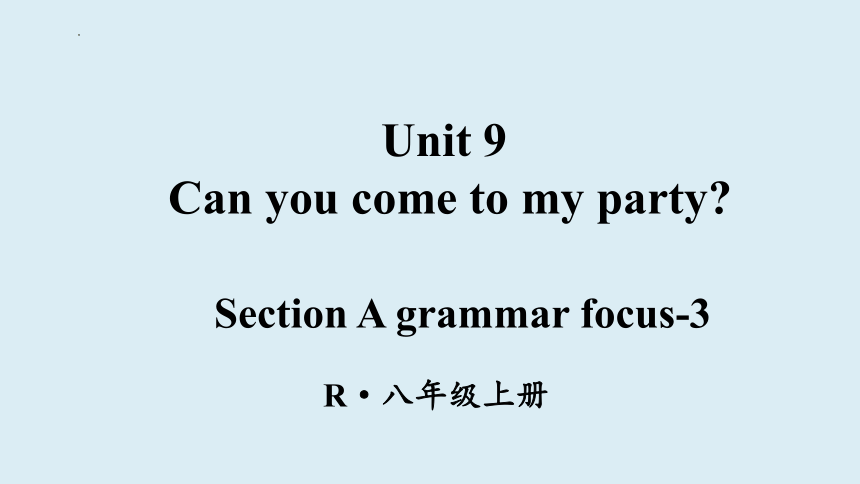 | |
| 格式 | pptx | ||
| 文件大小 | 221.5KB | ||
| 资源类型 | 教案 | ||
| 版本资源 | 人教新目标(Go for it)版 | ||
| 科目 | 英语 | ||
| 更新时间 | 2023-11-07 15:14:56 | ||
图片预览

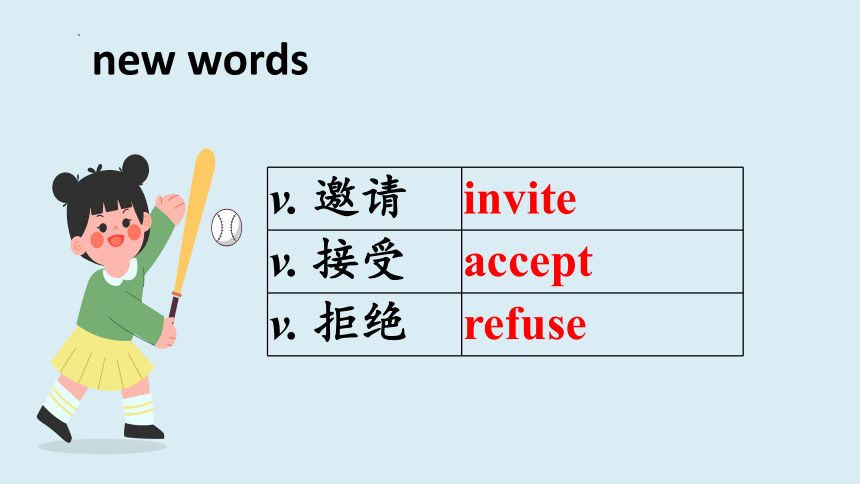
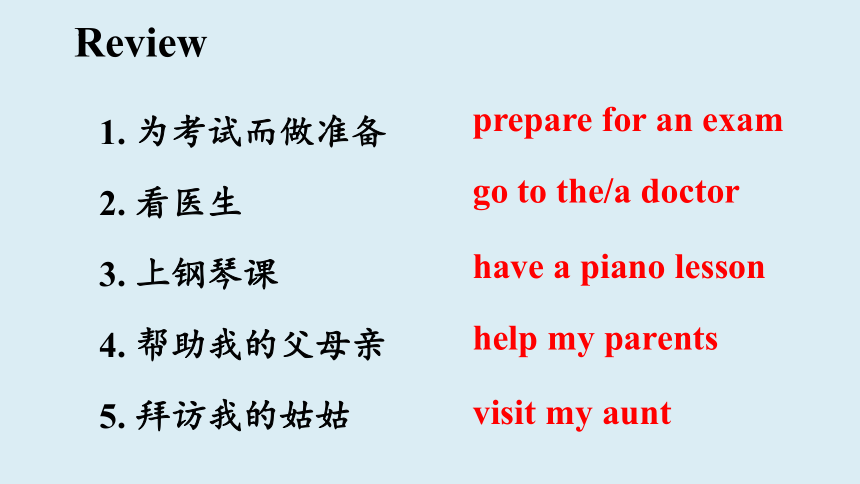
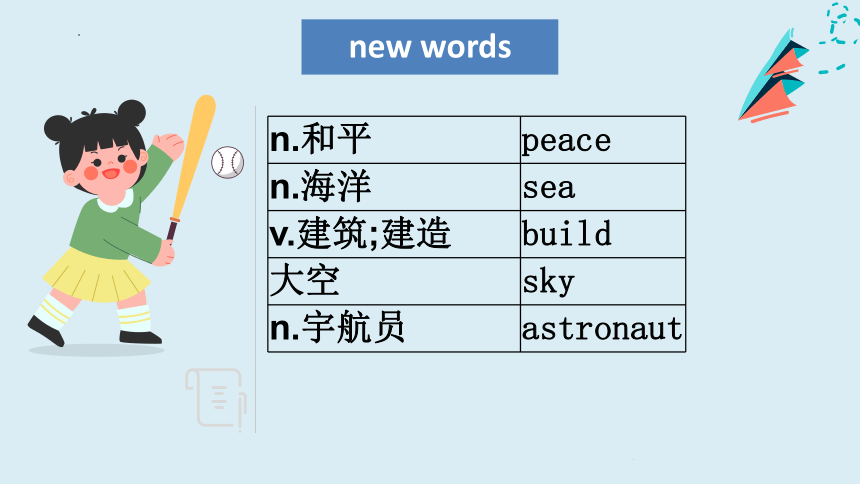
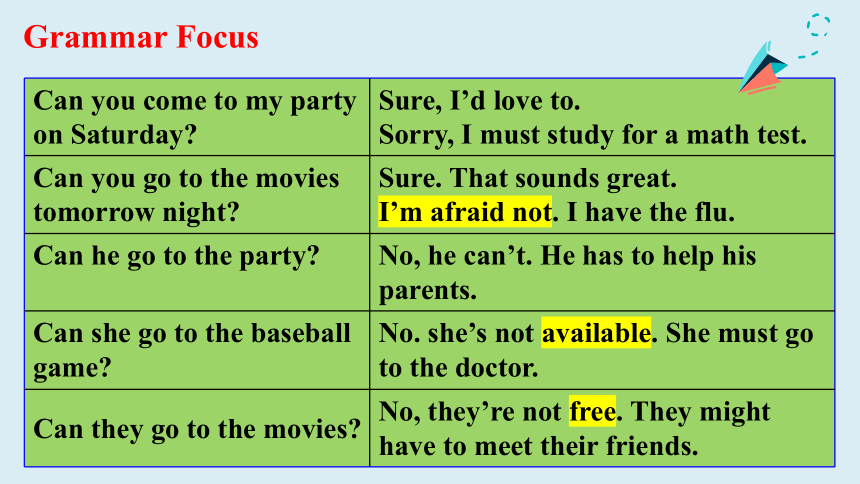
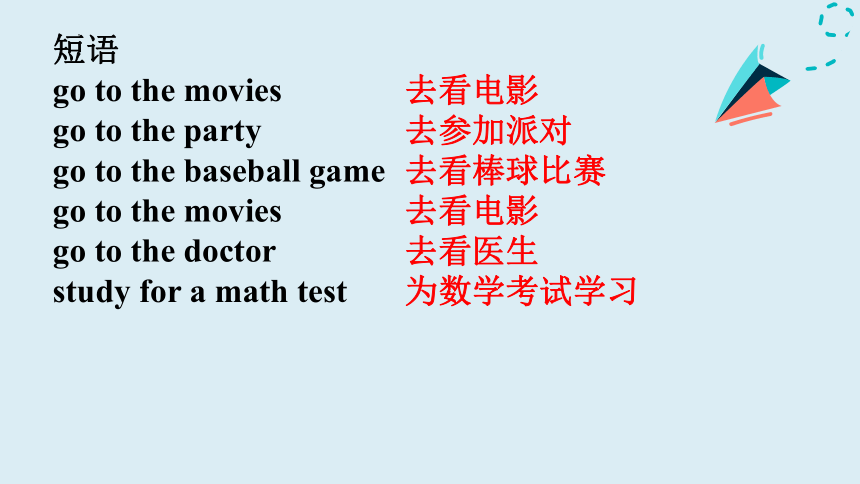
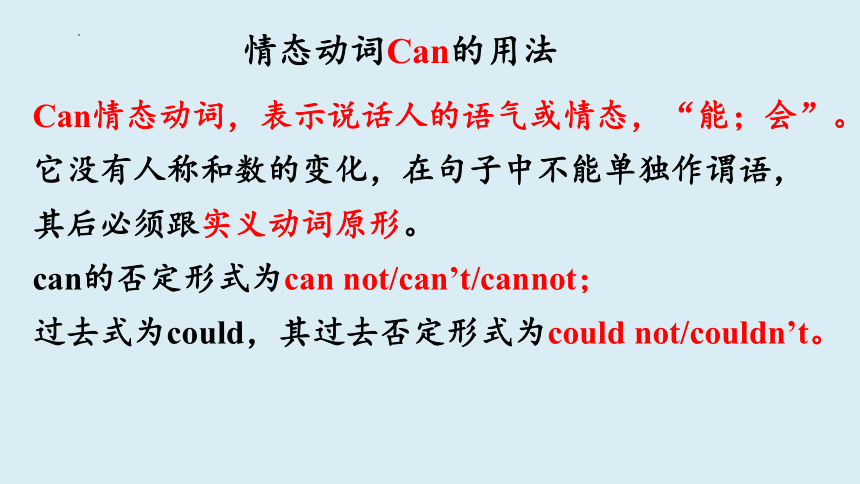
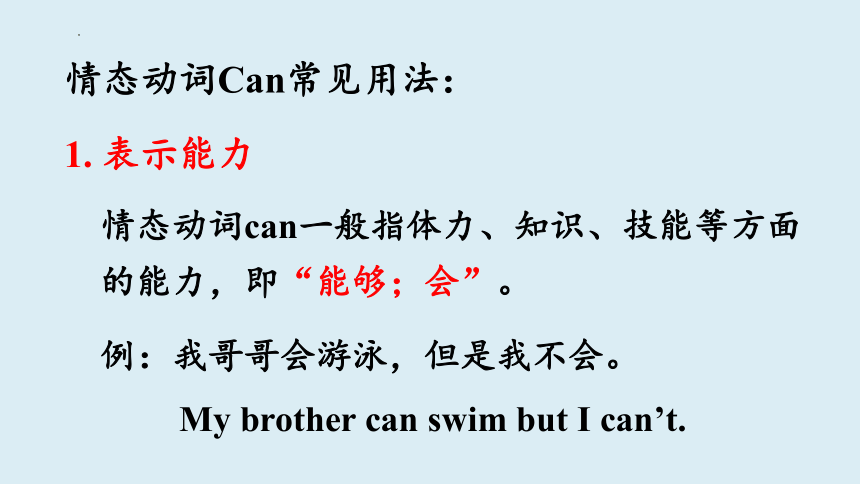
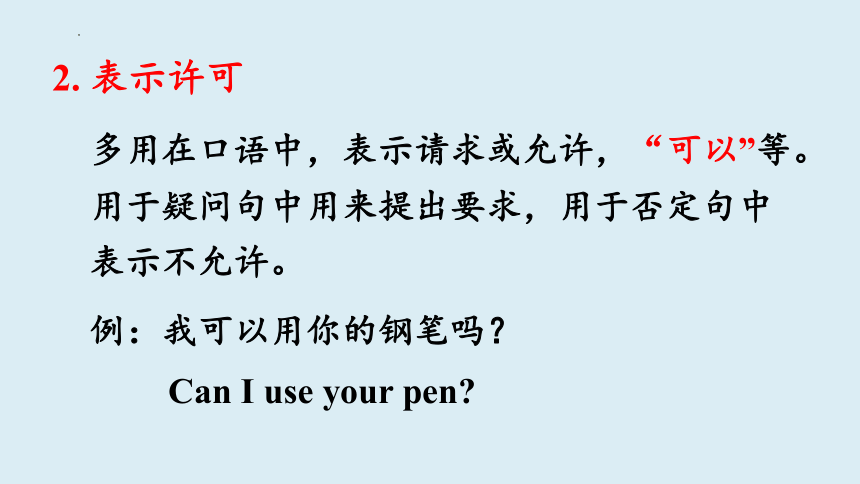
文档简介
(共27张PPT)
Unit 9
Can you come to my party
R·八年级上册
Section A grammar focus-3
v. 邀请 invite
v. 接受 accept
v. 拒绝 refuse
new words
Review
1. 为考试而做准备
2. 看医生
3. 上钢琴课
4. 帮助我的父母亲
5. 拜访我的姑姑
prepare for an exam
go to the/a doctor
have a piano lesson
help my parents
visit my aunt
4
new words
n.和平 peace
n.海洋 sea
v.建筑;建造 build
大空 sky
n.宇航员 astronaut
Can you come to my party on Saturday Sure, I’d love to.
Sorry, I must study for a math test.
Can you go to the movies tomorrow night Sure. That sounds great.
I’m afraid not. I have the flu.
Can he go to the party No, he can’t. He has to help his parents.
Can she go to the baseball game No. she’s not available. She must go to the doctor.
Can they go to the movies No, they’re not free. They might have to meet their friends.
Grammar Focus
短语
go to the movies
go to the party
go to the baseball game
go to the movies
go to the doctor
study for a math test
去看电影
去参加派对
去看棒球比赛
去看电影
去看医生
为数学考试学习
情态动词Can的用法
Can情态动词,表示说话人的语气或情态,“能;会”。它没有人称和数的变化,在句子中不能单独作谓语,其后必须跟实义动词原形。
can的否定形式为can not/can’t/cannot;
过去式为could,其过去否定形式为could not/couldn’t。
情态动词Can常见用法:
1. 表示能力
情态动词can一般指体力、知识、技能等方面的能力,即“能够;会”。
例:我哥哥会游泳,但是我不会。
My brother can swim but I can’t.
2. 表示许可
多用在口语中,表示请求或允许,“可以”等。用于疑问句中用来提出要求,用于否定句中表示不允许。
例:我可以用你的钢笔吗?
Can I use your pen
3. 表示推测
情态动词can表示推测时,常用于否定句或疑问句,“(不)可能”。用于肯定句中表示理论上的可能性,“有时会”。
例:这里的春天有时可能会非常冷。
It can be very cold here in spring.
4. 表示邀请
情态动词can还可以表示邀请;could更礼貌、委婉。表示邀请时的用法如下:
Can/Could+主语+动词原形+其他?
Would you like ... 你想要/愿意... +名词/代词/动词不定式
Shall we... 我们... 好吗?+动原
Let’s...我们...吧!+动原
Why not... Why don’t you/we... 我们为什么不... +动原
How/What about......怎么样? +v-ing
当用情态动词can发出邀请时
接受邀请
Sure./ Of course./ Certainly./ Yes, I’d love to.
拒绝邀请
Sorry, I can't. / I’d love to, but.../ I’m afraid not. I must...
情态动词有:may/might, can/could, must, have to,
shall/should, will/would, ought to,
need, dare, used to
1. 不能独立作谓语,只能和动词原形一起构成谓语,
表示说话人的语气和情态。
2. 没有人称和数的变化。 (have to除外)
3. 否定形式:在其之后加not (have to除外)。
疑问形式:情态动词提到主语之前 (have to 除外)
3a
Complete the answers with might and one of the phrases in the box.
watch TV
on the weekend
my cousin
visit my grandparents
practice the violin
1. A: What are you going to do on
Saturday
B: I’m not sure. I might
_____________________
2. A: What are you planning to do
after school
B: I don’t know.
_____________________
visit my grandparents.
I might watch TV.
3. A: When will you finish the science homework
B:________________________________________
4. A: Who are you going to the movies with
B:____________________________________
5. A: Are you free to come to my place on Saturday
B: _______________________________________
I don’t know. I might finish it on the weekend.
I’m not sure. I might go with my cousin.
I’m not sure. I might have to practice the violin.
3b
Complete the sentences below. Use the words in brackets to help you.
1. Inviting:___________________________ (can/play tennis)
Accepting:________________________________
2. Inviting:_______________________________________
(would like to/go to the movies)
Refusing:________________________________
Reason:__________________________________
(might have to)
Can you play tennis with me on Saturday
Sure. That sounds great.
Would you like to go to the movies on Friday
Sorry, I can’t.
I might have to go out with my parents.
3. Inviting: __________________________________
(can/hang out with us tonight)
Refusing: _________________________________
Reason: __________________________________(must)
4. Inviting: __________________________________
__________________________________
(would like to / come to my birthday party)
Accepting:________________________________
Can you hang out with us tonight
Would you like to come to my birthday
party
Sorry, I’m not free.
Sure, I’d love to.
I must study for a test.
invite 邀请
invitation邀请,请柬
invite sb. to do sth.邀请某人做某事
invite sb. to sp.邀请某人去某地
He invited me to go to the movies.
Bob invited me to her home for supper.
accept接受, 主观上收到并接受某物
She happily accepted the birthday gift from me.
receive 收到, 客观上收到某物,但不一定接受
接受教育,接见
Yesterday he received a letter.
refuse拒绝,
refuse sb./sth.拒绝某人/某事
refuse to do sth.拒绝做某事
She refused his invitation to the tea party.
They refused to tell the truth.
1. She _________ a lot of presents on her birthday, but she didn't really accept any of them.
她生日时收到了很多礼物,但她并没有真正接受其中的任何一个。
2. She ________ to go to the party with me.
她拒绝和我一起去参加派对。
3.The child refused ______ his vegetables.
这个孩子拒绝吃他的蔬菜。
received
refused
to eat
3c
Write down everything you have to do next
week. Choose a day and time to have a party.
Then invite classmates to your party.
A: Can you come to my party
B: When is it
A: Next week, on Thursday night.
B: I’m sorry. I have to study for a math test.
邀请的句型:
Can you come to my party
Would you like to come to my party
同意邀请的回答:
Sure, I'd love to.
Yes, I'd be happy to.
拒绝邀请的回答:
I'm sorry, I can't. I have another plan.
Thanks for inviting me, but I'm busy that day.
Summary
1. Thank you for (invite/inviting)me, but I'm unable to join you for the movies.
2. I have to study (at/ for) the test tonight.
3. Sally has too (much/ many) homework
to do.
Exercise
一、选择正确的选项填空。
for
much
inviting
4.She ___________ (invite/invited) me to her birthday party yesterday.
5.They __________ (invite/invited)us to their house for dinner last Tuesday.
invited
invited
1. A: 我这个周末要举办一个派对。你能来参加吗?
B: 我很愿意!几点开始?
A: I'm having a party this weekend. Can you come to my party
B: I'd love to! What time does it start
2. A: 你能在星期六来参加我的派对吗?
B: 抱歉,那天晚上我有家庭晚餐。我去不了。
A: Can you come to my party on Saturday
B: Sorry, I have a family dinner that night. I can't make it.
翻译下列句子
3. A: 你能在星期天来参加我的派对吗?
B: 不太确定。我可能有计划,但我会告诉你的。
A: Can you come to my party on Sunday
B: I'm not sure. I might have plans, but I'll let you know.
4. A: 你能在下周来参加我的派对吗?
B: 很抱歉,但那天我有一场足球比赛。我去不了。
A: Can you come to my party next week
B: I'm really sorry, but I have a soccer game that day. I can't make it.
Unit 9
Can you come to my party
R·八年级上册
Section A grammar focus-3
v. 邀请 invite
v. 接受 accept
v. 拒绝 refuse
new words
Review
1. 为考试而做准备
2. 看医生
3. 上钢琴课
4. 帮助我的父母亲
5. 拜访我的姑姑
prepare for an exam
go to the/a doctor
have a piano lesson
help my parents
visit my aunt
4
new words
n.和平 peace
n.海洋 sea
v.建筑;建造 build
大空 sky
n.宇航员 astronaut
Can you come to my party on Saturday Sure, I’d love to.
Sorry, I must study for a math test.
Can you go to the movies tomorrow night Sure. That sounds great.
I’m afraid not. I have the flu.
Can he go to the party No, he can’t. He has to help his parents.
Can she go to the baseball game No. she’s not available. She must go to the doctor.
Can they go to the movies No, they’re not free. They might have to meet their friends.
Grammar Focus
短语
go to the movies
go to the party
go to the baseball game
go to the movies
go to the doctor
study for a math test
去看电影
去参加派对
去看棒球比赛
去看电影
去看医生
为数学考试学习
情态动词Can的用法
Can情态动词,表示说话人的语气或情态,“能;会”。它没有人称和数的变化,在句子中不能单独作谓语,其后必须跟实义动词原形。
can的否定形式为can not/can’t/cannot;
过去式为could,其过去否定形式为could not/couldn’t。
情态动词Can常见用法:
1. 表示能力
情态动词can一般指体力、知识、技能等方面的能力,即“能够;会”。
例:我哥哥会游泳,但是我不会。
My brother can swim but I can’t.
2. 表示许可
多用在口语中,表示请求或允许,“可以”等。用于疑问句中用来提出要求,用于否定句中表示不允许。
例:我可以用你的钢笔吗?
Can I use your pen
3. 表示推测
情态动词can表示推测时,常用于否定句或疑问句,“(不)可能”。用于肯定句中表示理论上的可能性,“有时会”。
例:这里的春天有时可能会非常冷。
It can be very cold here in spring.
4. 表示邀请
情态动词can还可以表示邀请;could更礼貌、委婉。表示邀请时的用法如下:
Can/Could+主语+动词原形+其他?
Would you like ... 你想要/愿意... +名词/代词/动词不定式
Shall we... 我们... 好吗?+动原
Let’s...我们...吧!+动原
Why not... Why don’t you/we... 我们为什么不... +动原
How/What about......怎么样? +v-ing
当用情态动词can发出邀请时
接受邀请
Sure./ Of course./ Certainly./ Yes, I’d love to.
拒绝邀请
Sorry, I can't. / I’d love to, but.../ I’m afraid not. I must...
情态动词有:may/might, can/could, must, have to,
shall/should, will/would, ought to,
need, dare, used to
1. 不能独立作谓语,只能和动词原形一起构成谓语,
表示说话人的语气和情态。
2. 没有人称和数的变化。 (have to除外)
3. 否定形式:在其之后加not (have to除外)。
疑问形式:情态动词提到主语之前 (have to 除外)
3a
Complete the answers with might and one of the phrases in the box.
watch TV
on the weekend
my cousin
visit my grandparents
practice the violin
1. A: What are you going to do on
Saturday
B: I’m not sure. I might
_____________________
2. A: What are you planning to do
after school
B: I don’t know.
_____________________
visit my grandparents.
I might watch TV.
3. A: When will you finish the science homework
B:________________________________________
4. A: Who are you going to the movies with
B:____________________________________
5. A: Are you free to come to my place on Saturday
B: _______________________________________
I don’t know. I might finish it on the weekend.
I’m not sure. I might go with my cousin.
I’m not sure. I might have to practice the violin.
3b
Complete the sentences below. Use the words in brackets to help you.
1. Inviting:___________________________ (can/play tennis)
Accepting:________________________________
2. Inviting:_______________________________________
(would like to/go to the movies)
Refusing:________________________________
Reason:__________________________________
(might have to)
Can you play tennis with me on Saturday
Sure. That sounds great.
Would you like to go to the movies on Friday
Sorry, I can’t.
I might have to go out with my parents.
3. Inviting: __________________________________
(can/hang out with us tonight)
Refusing: _________________________________
Reason: __________________________________(must)
4. Inviting: __________________________________
__________________________________
(would like to / come to my birthday party)
Accepting:________________________________
Can you hang out with us tonight
Would you like to come to my birthday
party
Sorry, I’m not free.
Sure, I’d love to.
I must study for a test.
invite 邀请
invitation邀请,请柬
invite sb. to do sth.邀请某人做某事
invite sb. to sp.邀请某人去某地
He invited me to go to the movies.
Bob invited me to her home for supper.
accept接受, 主观上收到并接受某物
She happily accepted the birthday gift from me.
receive 收到, 客观上收到某物,但不一定接受
接受教育,接见
Yesterday he received a letter.
refuse拒绝,
refuse sb./sth.拒绝某人/某事
refuse to do sth.拒绝做某事
She refused his invitation to the tea party.
They refused to tell the truth.
1. She _________ a lot of presents on her birthday, but she didn't really accept any of them.
她生日时收到了很多礼物,但她并没有真正接受其中的任何一个。
2. She ________ to go to the party with me.
她拒绝和我一起去参加派对。
3.The child refused ______ his vegetables.
这个孩子拒绝吃他的蔬菜。
received
refused
to eat
3c
Write down everything you have to do next
week. Choose a day and time to have a party.
Then invite classmates to your party.
A: Can you come to my party
B: When is it
A: Next week, on Thursday night.
B: I’m sorry. I have to study for a math test.
邀请的句型:
Can you come to my party
Would you like to come to my party
同意邀请的回答:
Sure, I'd love to.
Yes, I'd be happy to.
拒绝邀请的回答:
I'm sorry, I can't. I have another plan.
Thanks for inviting me, but I'm busy that day.
Summary
1. Thank you for (invite/inviting)me, but I'm unable to join you for the movies.
2. I have to study (at/ for) the test tonight.
3. Sally has too (much/ many) homework
to do.
Exercise
一、选择正确的选项填空。
for
much
inviting
4.She ___________ (invite/invited) me to her birthday party yesterday.
5.They __________ (invite/invited)us to their house for dinner last Tuesday.
invited
invited
1. A: 我这个周末要举办一个派对。你能来参加吗?
B: 我很愿意!几点开始?
A: I'm having a party this weekend. Can you come to my party
B: I'd love to! What time does it start
2. A: 你能在星期六来参加我的派对吗?
B: 抱歉,那天晚上我有家庭晚餐。我去不了。
A: Can you come to my party on Saturday
B: Sorry, I have a family dinner that night. I can't make it.
翻译下列句子
3. A: 你能在星期天来参加我的派对吗?
B: 不太确定。我可能有计划,但我会告诉你的。
A: Can you come to my party on Sunday
B: I'm not sure. I might have plans, but I'll let you know.
4. A: 你能在下周来参加我的派对吗?
B: 很抱歉,但那天我有一场足球比赛。我去不了。
A: Can you come to my party next week
B: I'm really sorry, but I have a soccer game that day. I can't make it.
同课章节目录
- Unit 1 Where did you go on vacation?
- Section A
- Section B
- Unit 2 How often do you exercise?
- Section A
- Section B
- Unit 3 I'm more outgoing than my sister.
- Section A
- Section B
- Unit 4 What's the best movie theater?
- Section A
- Section B
- Unit 5 Do you want to watch a game show?
- Section A
- Section B
- Unit 6 I'm going to study computer science.
- Section A
- Section B
- Unit 7 Will people have robots?
- Section A
- Section B
- Unit 8 How do you make a banana milk shake?
- Section A
- Section B
- Unit 9 Can you come to my party?
- Section A
- Section B
- Unit 10 If you go to the party, you'll have a grea
- Section A
- Section B
